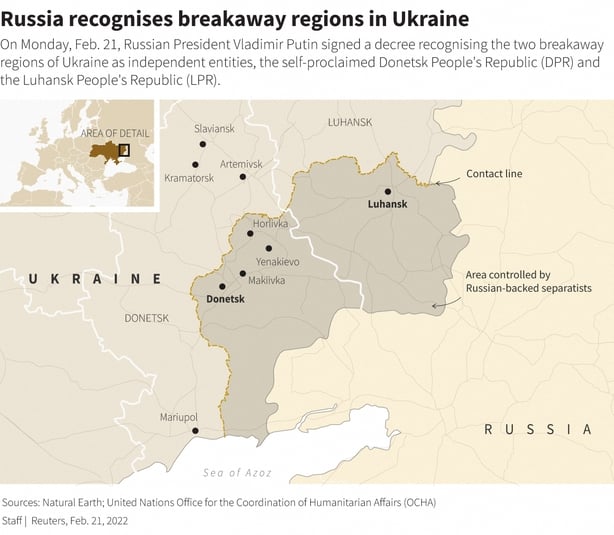The Minister for Foreign Affairs has said Ireland's support for Ukraine’s sovereignty and territorial integrity within its internationally recognised borders, and its right to choose its own foreign and security policy path, is unwavering.
In a statement, Simon Coveney said the decision by the Russian Federation to proceed with the recognition of the non-government controlled areas of Donetsk and Luhansk oblast of Ukraine as independent entities "contravenes international law".
He said it is "a blatant violation" of Ukraine's territorial integrity, and marks a "clear and unilateral breach" of the Minsk agreements.
"Ireland supports a clear and strong EU response, including additional sanctions measures," the minister said.
On Twitter earlier, Mr Coveney described it as a "very negative development".
Very negative development. Effectively means Russia is abandoning the Minsk Agreement. https://t.co/xcYFO0pbzv
— Simon Coveney (@simoncoveney) February 21, 2022
The Ukraine crisis has intensified after Russian President Vladimir Putin said he would recognise two breakaway republics.
Tonight the Taoiseach Micheál Martin said in a tweet that President Putin's decision to recognise the separatist territories of Ukraine is a violation of international law, and breaches Ukrainian sovereignty.
Tonight's announcement by President Putin recognising the separatist territories of Ukraine is a violation of international law, and breaches Ukrainian sovereignty.
— Micheál Martin (@MichealMartinTD) February 21, 2022
With our EU partners, we will stand in solidarity with Ukraine.
British Prime Minister Boris Johnson said the decision to recognise Donetsk and Luhansk in eastern Ukraine was an "ill omen" and a flagrant breach of international law.
It is a "dark sign" things are moving in the wrong direction, Mr Johnson said at a Downing Street press conference, adding that he was considering whether the actions could trigger the imposition of fresh sanctions on Russia.
"This is plainly in breach of international law, it's a flagrant violation of the sovereignty and integrity of Ukraine," he said.
"It is a repudiation of the Minsk process and the Minsk Agreements. I think it's a very ill omen and a very dark sign."
It was "yet another indication that things are moving in the wrong direction in Ukraine".
Russia's decision to recognise Ukraine breakaway regions as independent is a "dark sign" things are moving in the wrong direction, says British Prime Minister Boris Johnson | Read more: https://t.co/aGh7PYSin8 pic.twitter.com/47ioDSjMVC
— RTÉ News (@rtenews) February 21, 2022
The move appears to have dashed hopes for a diplomatic breakthrough which had been raised with the possibility of talks between Mr Putin and US President Joe Biden.
Mr Johnson had previously said sanctions would be triggered if Russia invaded Ukraine.
But he said: "Plainly what has happened is extremely bad news and we will be urgently talking to our friends and allies around the world, all of whom are jointly signed up with us in this package of sanctions."
Mr Johnson said it was "becoming clear that we are going to need to start applying as much pressure as we possibly can".
"It is hard to see how this situation improves," he acknowledged.

The United Nations Secretary-General Antonio Guterres was scrapping his schedule and racing back to headquarters in New York citing the "deteriorating situation regarding Ukraine," his spokesman said.
European Union leaders warned that the bloc and its allies will react firmly.
"The recognition of the two separatist territories in Ukraine is a blatant violation of international law, the territorial integrity of Ukraine and the Minsk agreements," EU chiefs Ursula von der Leyen and Charles Michel each tweeted.
"The EU and its partners will react with unity, firmness and with determination in solidarity with Ukraine."
French President Emmanuel Macron condemned the Kremlin's move, urging the European Union to agree new sanctions against Moscow.
"The president condemns the decision.... He is demanding an emergency meeting of the UN Security Council as well as the adoption of targeted European sanctions," the French presidency said in a statement.
"This is clearly a unilateral violation of Russia's international commitments and a breach of Ukraine's sovereignty," it added.
Mr Putin's decision could ignite a potentially devastating conflict with Kyiv's Western-backed government.
The recognition will effectively end an already shaky peace plan in the separatist conflict in Ukraine's east, and paves the way for Russia to move in troops to protect hundreds of thousands of residents in the regions who have been granted Russian passports.
It overshadowed last-ditch diplomatic attempts to ease weeks of tensions over fears Russia has been planning an all-out invasion of its pro-Western neighbour.
Read more:
Putin recognises Ukraine rebel regions
Donetsk and Lugansk: Ukraine's breakaway republics
What Russian recognition of breakaway regions means
NATO chief Jens Stoltenberg said: "I condemn Russia's decision to extend recognition to the self-proclaimed 'Donetsk People's Republic' and 'Luhansk People's Republic'."
In a statement, he said: "This further undermines Ukraine's sovereignty and territorial integrity, erodes efforts towards a resolution of the conflict, and violates the Minsk Agreements, to which Russia is a party."
"Moscow continues to fuel the conflict in eastern Ukraine by providing financial and military support to the separatists. It is also trying to stage a pretext to invade Ukraine once again."
He urged Russia "to choose the path of diplomacy" and to withdraw its more than 150,000 troops deployed to Ukraine's borders for what many western countries expect will be an imminent attack.
Ukraine is not a NATO member country, and Mr Stoltenberg has said NATO forces will not be sent in to defend it from Russia.
But allies, particularly the United States, have been sending weapons and other supplies to Ukraine, and have sent forces to neighbouring countries that are part of NATO.
Additional reporting by Mícheál Lehane

